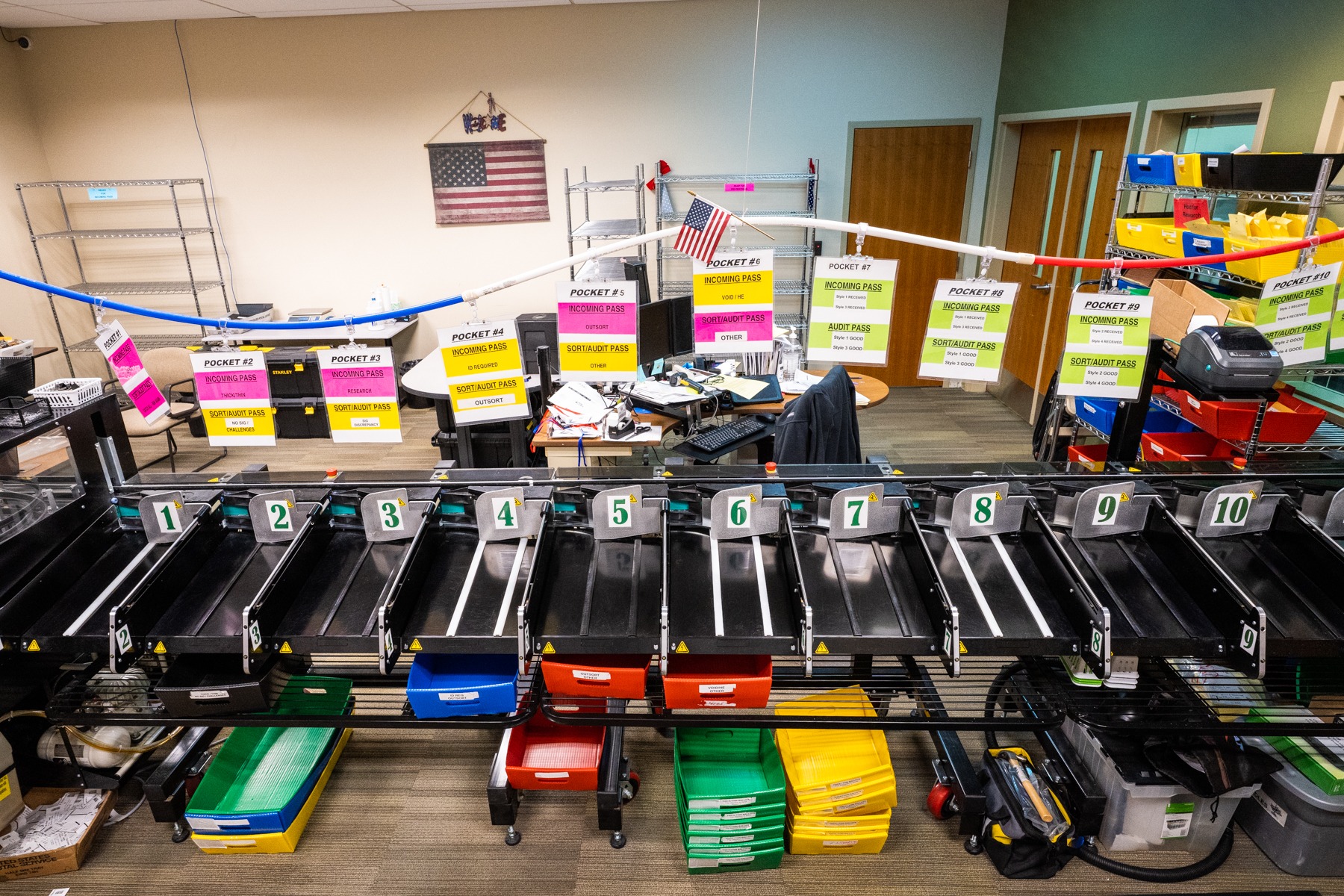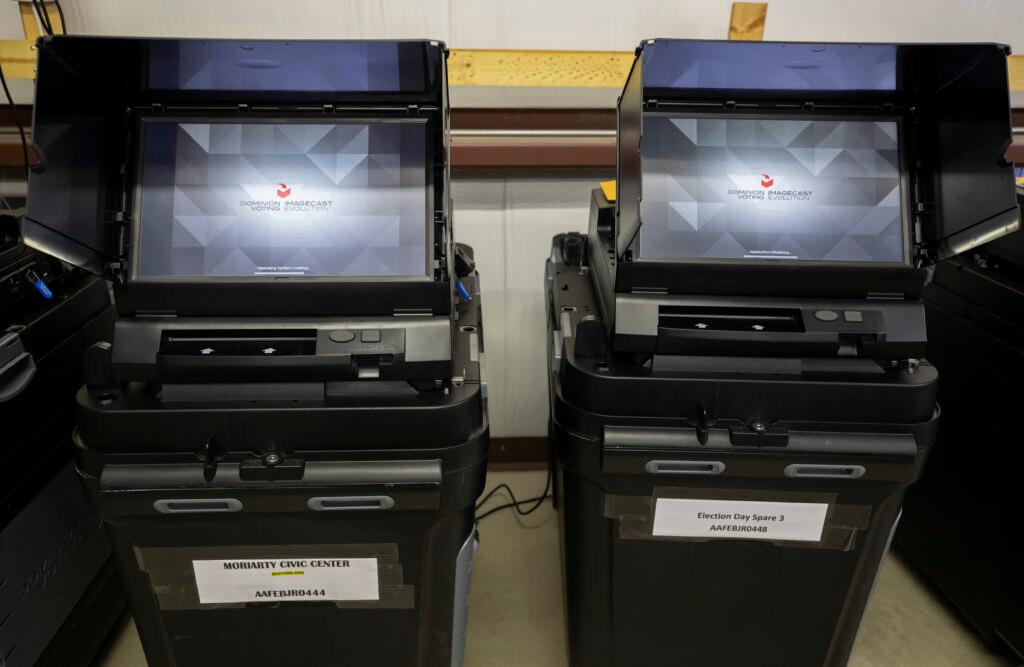
A conservative social media personality and a New Jersey Republican election activist pull into the Mesa County parking lot in a Cybertruck.
That’s the setup to a video posted online discussing the trial of a former Mesa County Clerk who faces 10 charges related to her actions granting unauthorized access to county voting equipment.
“We drove for what felt like an eternity through the Rocky Mountains in a Cybertruck to investigate this case, which is one of the most important in the country. They are trying to make an example out of Tina Peters, and we CAN'T let that happen,” reads a social media post accompanying the video.
The video is one of many posts that can be found across the internet discussing the ties between Peters’ trial and long-disproven conspiracy theories over the nation’s election systems. The video also includes a clip of the trial — a lengthy argument from one of Peters’ attorneys, Dan Hartman, discussing Dominion Voting Systems machines in one of many admissibility arguments that has peppered the Peters’ trial, which is behind schedule.
The conspiracy that Denver-based Dominion, Voting Systems flipped votes from Trump to Biden has its roots in Colorado as well. Shortly after the 2020 election, a conservative podcaster from Douglas County began claiming he’d infiltrated an earlier call by local Antifa organizers during which someone identifying himself as “Eric from Dominion” said the company would ensure Joe Biden’s victory. Dominion and one of its former employees are pursuing defamation lawsuits against news outlets, the Trump campaign and its allies for spreading those claims.
Over the course of dozens of objections — as well as numerous motions ruled on before trial — prosecutors have sought to limit discussion of voting conspiracy theories, the inner workings of equipment and past election results. But that has not deterred repeated efforts by the defense to put Dominion Voting Systems in the center of a trial that’s meant to determine if Peters attempted to influence a public servant; committed criminal impersonation or conspired to do so; engaged in official misconduct; and violated her duty among other charges.
Subpoena fight
On Wednesday, 21st Judicial District Judge Matthew Barrett ruled to quash a subpoena that would have required a lawyer from Dominion Voting Systems to testify in the case.
Leah Regan-Smith, an attorney representing that Dominion employee, said members of Peters’ defense team are also working on other cases tied with election disinformation and Dominion and that the subpoena amounted to a “continuing pattern of harassment” against Dominion employees.
“He has faced significant and actual threats to his life in relation to claims like this. I can personally speak to one of those instances. My firm used to share a building with Dominion and I was put on lockdown when a man tried to get into their office and then was found in his car full of guns looking through a rifle scope in their windows,” Regan-Smith said.

John Case, an attorney representing Peters, argued the Dominion lawyer should be compelled to testify and any questions deemed irrelevant to Peters’ case could be handled in the moment, adding that “I'm not required to disclose to the DA or anybody else what the defense is going to present for evidence.”
Case then pivoted to another matter, regarding the testimony of Gerald Wood, which he tried to tie to the discussion of the Dominion employee.
“The court is going to discover when this evidence comes in, that their whole case is built on lies,” Case said.
Barrett made several offers to Case to present his justification for bringing in the Dominion attorney without the prosecution or jury present.
“I don't know if it's because the camera's back there or there's an audience. I just want an answer to the question, sir,” Barrett pushed before Case agreed to discuss the matter in private.
“Okay,” Barrett responded. “So everyone out of the courtroom, turn off the camera.”
About 30 minutes later, the parties were brought back in and Barrett ruled to quash the subpoena, thereby making it so the Dominion attorney did not have to come testify.
Defense presses Dominion employee
A day earlier, Peters’ team did get their chance to take on the Colorado-based election systems provider as a Dominion Voting Systems employee fielded questions about the company’s equipment, organizational chart and even its Denver addresses.
David Stahl, who works on the customer service side of the company (customers in this case being the local governments who use Dominion machines), testified for the prosecution, particularly about his involvement in the May 2021, software update in Mesa County called a “trusted build.”
Stahl, who was there in person for the update, was asked by prosecuting attorney Robert Shapiro if he knew that there were ongoing discussions in Mesa County relating to voting security.
“Yeah, we had known that there was some scrutiny coming from this area,” Stahl said.
Stahl answered questions related to how software updates are handled and his role with Dominion Voting Machines. However, when it was defense attorney John Case’s turn for cross-examination, the conversation pivoted to questions about the company itself. Dominion has been the subject of a number of conspiracies about voting integrity. Several of Case’s questions were blocked on objection from the prosecution, including if the machines had internet capability, or if they were made in China.

Stahl also got into a back-and-forth over comments he made about disinformation regarding elections.
“So that would be information that's communicated that the speaker knows is false?” Case asked.
“Yeah. When you are saying false things or lying, I would say that's disinformation,” Stahl replied.
“Now. Is that different from misinformation?” Case followed.
“I would have to revert back to the dictionary for the actual definitions,” Stahl responded.
Case then pressed Stahl on comments he made, suggesting that part of his role at Dominion was to help dispel misinformation about election security.
“There are a lot of misrepresentations going on in the elections industry right now, and it's important that we get facts out there on how things are conducted," Stahl said, prompting a question from Case as to who Stahl meant by “we.”
“Every election administrator who operates with integrity in this country should get the facts out there about their election management system,” Stahl responded.
“Which facts? Your facts?” Case asked, prompting an objection from Shapiro that was sustained by Barrett.
The defense’s line of questioning also got into the decertification of Mesa County’s election equipment, which happened after photos from the trusted build surfaced, over concerns that the equipment’s security could no longer be guaranteed.
Mesa County rapidly entered into a new contract with Dominion Voting Systems that included replacing the decertified equipment. When Shapiro raised objections about this line of questioning, Barrett said the defense could discuss it if they wanted, but it might not benefit them.
“It's a risk-reward as the court understands what's happening here. That is, they — the defendant — understands that by bringing this in, the jury may hear evidence that the actions of the defendant came at a great cost to the county. Yes. But on the other hand, it's admissible evidence, plain and simple in the court's mind, because it allows the defendant to ask questions that are directly related to bias and credibility,” Barrett explained.









